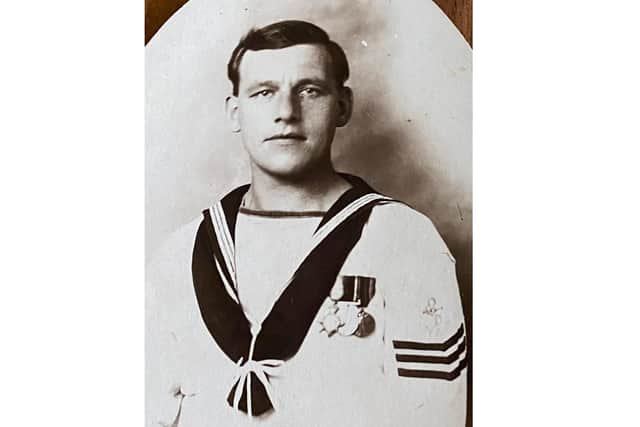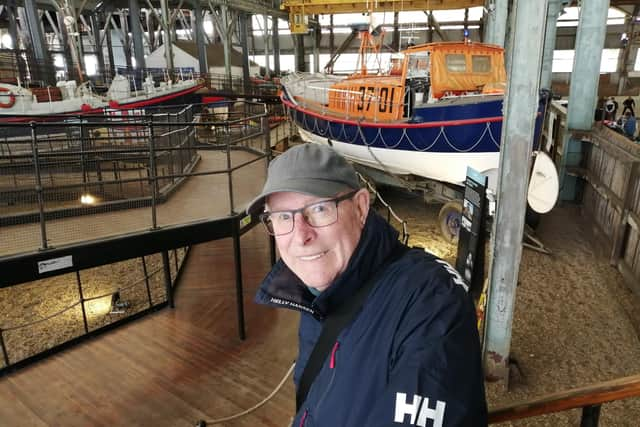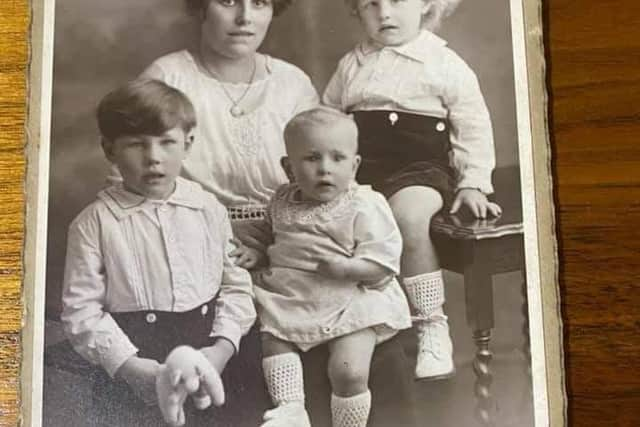Royal Navy cruiser torpedoed 108 years ago today during First World War remembered by grandson of HMS Hogue survivor
and live on Freeview channel 276
Hundreds of lives were lost on September 22, 1914, when the Royal Navy cruiser was sunk in the North Sea together with two of her sister ships.
Portsmouth-born David Edwards, the grandson of one of the survivors of the disaster, is marking the anniversary by reflecting on his grandfather’s incredible story.
Advertisement
Hide AdAdvertisement
Hide AdCharles William Edwards was a Londoner by birth, but made Portsmouth his home.


He and his family lived at Hope Street in Landport and then moved to Ernest Road in Buckland where he died in 1947.
His grandson David was born in Fareham in December, 1950, and then taken home by his parents to Nightingale Road in Southsea.
After studying computer science at Brighton University, David joined American Express Bank.
Advertisement
Hide AdAdvertisement
Hide Ad

This job took him all over the world, but he knew something was missing - the sea.
Now retired, David volunteers for the RNLI, and became the chairman of the Carlisle fundraising branch of the charity after moving to Cumbria.
David told The News: ‘Today I have been thinking of my grandfather – Charles William Edwards.
‘It was 108 years ago today that he survived against all odds when in the early hours of the morning he found himself in the ice cold waters of the North Sea.
Advertisement
Hide AdAdvertisement
Hide Ad

‘He was a 22 year old stoker on board HMS Hogue, one of the three Chatham Division cruisers, on patrol off the Hook of Holland.
‘The cruisers were spotted by the German submarine U9 and torpedoed one by one.
‘They sank in just under two hours. The Hogue went down in minutes after being hit.
‘I never met Charles William as he died three years before I was born.
Advertisement
Hide AdAdvertisement
Hide Ad‘The story of his survival was passed on to me by my father when I was a child.
‘I did pay some attention at the time but it was only recently, when reading through the collected and published accounts of the survivors in the Live Bait Squadron book and after visiting the Historical Dockyard in Chatham that the full extent of what he had gone through really hit home.
‘From the various accounts we have read, it appears that there was a snap decision made that initially only family men were allowed to be lifted out of the water into rescue boats. ‘Charles William was one of those unmarried at the time.
‘In fact, most of the men aboard the cruisers were either young cadets or reservists.
Advertisement
Hide AdAdvertisement
Hide Ad‘The men were stripped naked to the waist and had to try to hold on to any flotsam for hours before they were rescued by the Dutch merchant ships, Flora and Titan.
‘There were other civilian ships nearby but they were not approaching for fear of entering a minefield.
‘It took hours in the freezing water praying and hoping to survive while watching helplessly some men not being able to float any longer being claimed by the sea.
‘A total of 62 officers and 1,397 men died in this tragedy, while 60 officers and 777 men were saved. And I am grateful that Charles William was one of those who was saved.
Advertisement
Hide AdAdvertisement
Hide Ad‘He only joined the Royal Navy three years before. He was born in Bermondsey and grew up in London.
SEE ALSO: Historic figureheads on wall of HMS Nelson's wardroom at Portsmouth's naval base could be removed
‘The family lore left us with a story that it was the bankruptcy of the family business following the introduction of the electric trams south of the river in London that broke up the family and Charles William headed for Portsmouth to join up.
‘After his ordeal he stayed with the Navy and his naval record tells us that for most of his life he served testing submarines and working with personnel being trained to serve as submariners. Quite a twist of fate there - or was it a deliberate choice?
‘Either way, he instilled the love of the sea in my father Arthur Frank Edwards, his third son and through my father in me.
Advertisement
Hide AdAdvertisement
Hide Ad‘My Dad served in the Navy and during the Second World War he was on Alexia, one of the MAC ships which were crudely and hurriedly made by welding a flight deck onto cargo ships and tankers.
‘Alexia was a fleet escort carrier serving on the North Atlantic convoys between Nova Scotia and Liverpool. But that’s another story.
‘Charles William fell in love with Portsmouth and having married my grandmother Beatrice Maud Stevenson in 1920 they lived there for the rest of their lives.’
Charles William’s naval record shows that he was paid a war gratuity.
Advertisement
Hide AdAdvertisement
Hide AdDavid added: ‘There was very little other fuss made about this tragedy.
‘The only real publicity it got was on the centenary in 2014 when the Chatham Historic Dockyard hosted a ceremony for the families of those lost and the survivors.
‘What I find very moving is the fact that after surviving HMS Hogue sinking Charles William managed to find the strength in himself to have that ordinary life – getting married, having a family, still serving in the Navy.
‘There was no counselling for the post traumatic stress the men endured yet he was brave enough to carry on.
Advertisement
Hide AdAdvertisement
Hide Ad‘There are a couple of stories from his everyday life passed on to me by my father about him stopping a runaway horse in Old Portsmouth when it was in full gallop. Very brave.
‘And then there was an occasion when his quick thinking saved a young boy’s life when he was in trouble in the sea off Southsea.’

